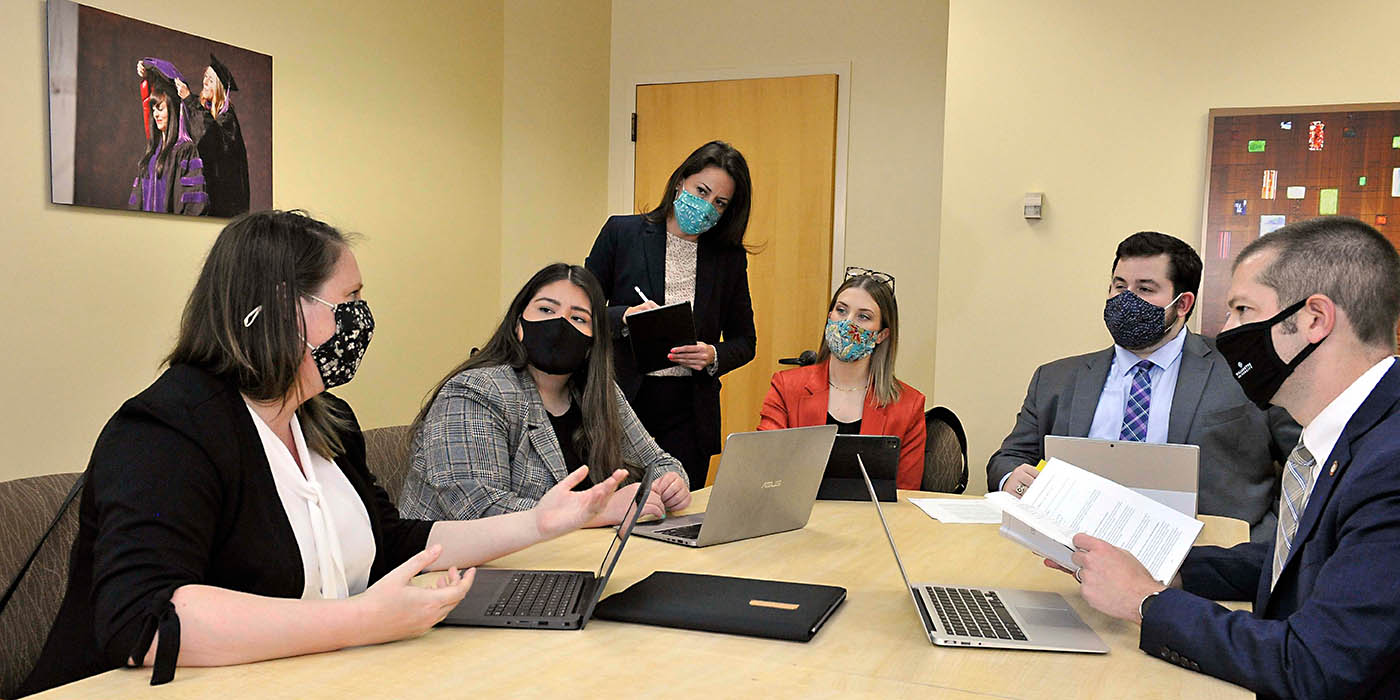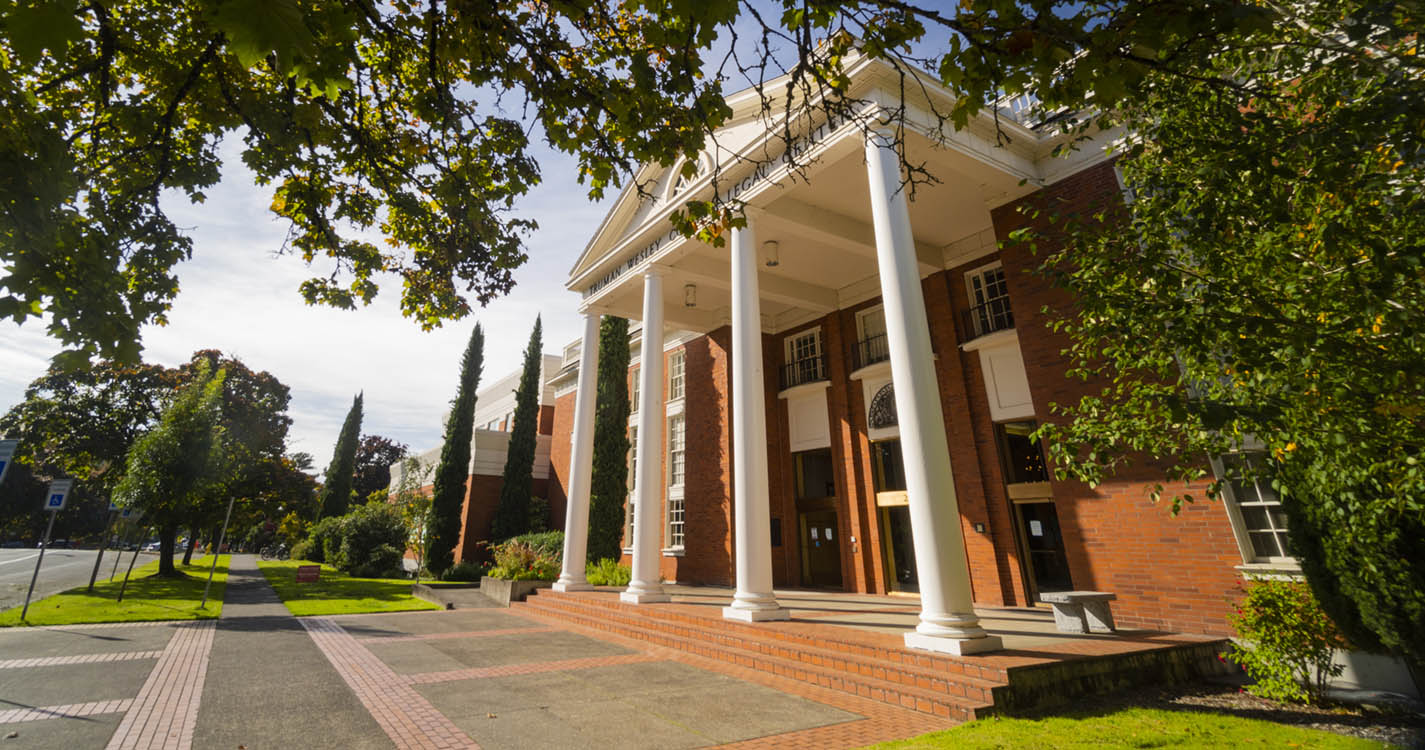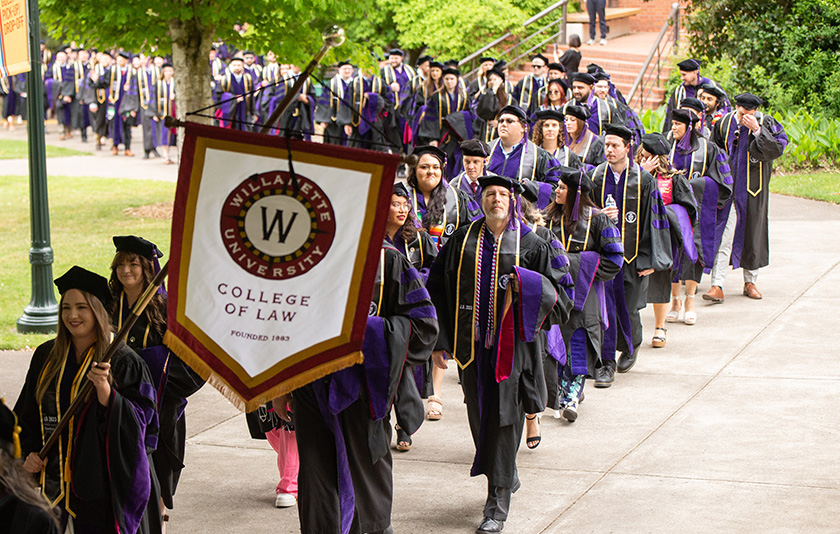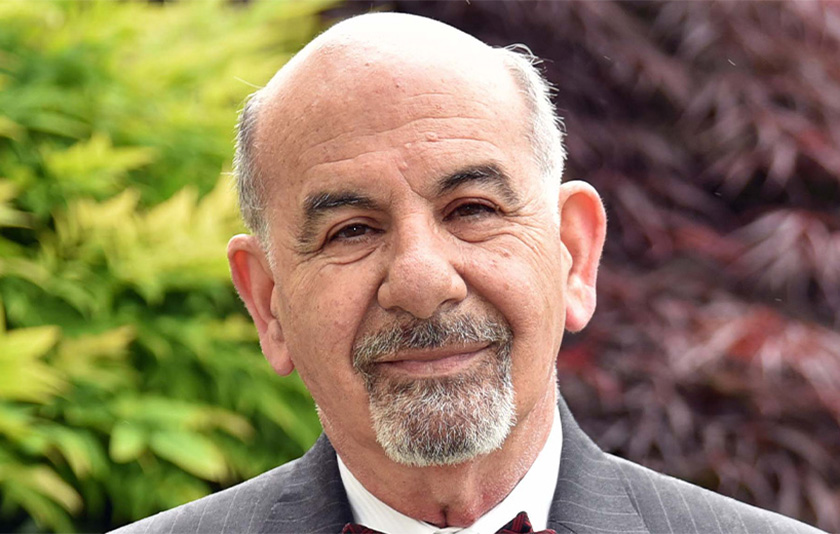After the diploma privilege ruling, members of the class of 2020 used bar study time to contribute to the profession and inform the conversation on racial justice in Oregon.
Racial Justice Task Force Report
Following an Oregon Supreme Court decision to grant “diploma privilege” due to the COVID-19 pandemic, Willamette Law class of 2020 graduates could’ve chosen to take a break — but instead, they put themselves to work.
Around 20 new attorneys formed the Racial Justice Task Force last summer to study the peremptory challenge, a tool used by attorneys during jury selection to remove jurors without having to state a reason. They conclude that the challenge needs work, or it needs to go.
In Oregon’s jury selection process, there’s a connection between the nature and use of peremptory challenges and implicit bias, the task force says. With a report set to be published in a forthcoming issue of the Willamette Law Review, the group says that now is the time to make changes to ensure equity and limit bias within this facet of the criminal justice system.
The task force formed last July after diploma privilege was given to members of the class of 2020 who faced historic difficulties resulting from the COVID-19 pandemic. Most graduates who accepted diploma privilege were admitted to the Oregon State Bar without taking the bar exam. With many not beginning their careers for several months due to the traditional testing and hiring seasons, Willamette Law’s graduates got busy.
Led by Samantha Klausen JD’20 and Eden Vasquez JD’20, the graduates decided to use their extra time to make a difference with something that mattered both to them personally and to the legal profession. Their work and contribution are twofold, supporting overdue change and establishing a precedent for enriching the profession should a bar exam be permanently discontinued.
Forming the Racial Justice Task Force
2020 was a challenging year, and it was no different for law students at Willamette. Many faced COVID-19 head-on, experiencing the illness with family and friends. Others watched the civil rights protests in Portland and around the country wishing they could help, but knowing they needed to study.
When other states, including Washington, began offering 2020 graduates diploma privilege, Vasquez and Klausen took note. They wondered what they could do if Oregon approved the same measure. Three weeks before the July bar exam, it was official. Graduates who passed character and fitness requirements and wanted to practice in Oregon could forego the test.
A Washington Racial Justice Task Force made up of recent graduates was already working on change. Vasquez and Klausen saw the opportunity and began calling classmates who were interested in advocacy and racial justice issues to find who might be interested in using their newfound free time for good. With about 20 on board, Dean Brian Gallini, working cooperatively with the Committee on Bias in the Oregon Justice System, helped the group narrow a topic and advised on organization structure.
“It was exceptionally important to me to show the country what examinees could do without the need to study for the bar exam,” Gallini says. “In this particular instance, I was interested in unifying that goal with the related effort to show Willamette as a leader in the long-overdue reckoning with systemic racism.”
From August to January, the group, tasked with examining peremptory challenges, put their legal skills to work. Oregon’s history was one of the most important components of the work, says Vasquez, who grew up here but didn’t know the state’s racist past until later in life.
“People consider Oregon one of the most progressive states, but I think it’s important for everyone to recognize and acknowledge Oregon’s history,” Vasquez says. “We are trying to move forward as a state, but some of the systems we have were created and established during this previous time.”
To complete the work, group members finished individual assignments and met virtually in small sections. Gallini chaired the task force, and other faculty members, including former Oregon Supreme Court Justices Paul De Muniz and Jack Landau, as well as Professor Caroline Davidson, mentored the team.
Resulting recommendations
The task force’s final, 40+ page report explores explicit and implicit bias and how federal courts have dealt with bias. In particular, the report highlights the 1986 U.S. Supreme Court ruling in Batson v. Kentucky and critiques the Batson system. It also explores remedies adopted by other states and outlines Oregon’s approach to bias in the jury selection process.
The Batson system, though it does not allow attorneys to use peremptory challenges to strike jurors due to race, deals with only explicit bias and potentially still permits implicit, or unconscious, bias in those decisions. With their research, Klausen says the task force learned implicit bias is a much bigger problem.
“What we found is that implicit bias is pervasive, existing in the most well-intentioned people, and it’s hard to recognize, even within ourselves,” Klausen says. “We also found that existing mechanisms do very little, if anything, to protect against implicit bias in jury selection. In fact, the peremptory challenge, while valuable in other ways, encourages attorneys to rely on ‘gut reactions,’ and there isn’t really a tool to adequately challenge if that gut reaction is rooted in implicit bias or unconscious stereotyping.”
To address the issue in Oregon, the task force concludes their report with two recommendations to reduce the role of implicit bias in jury selection and protect the reputation and function of Oregon’s legal profession. They propose either abolishing peremptory challenges in criminal proceedings or implementing a new rule similar to those enacted in Washington and California to strengthen Batson challenges and expand classes of persons protected against discrimination.
Gallini says the peremptory challenge focus is just a narrow slice of the racial justice conversation, but its impact could be profound.
“Because the justice system is one that can strip a defendant of his or her liberty, it’s critical that we work to eliminate — or at least reduce — the role that bias plays in that process,” he says. “That’s what the task force seeks to address, even if in an incremental manner.”
In addition to appearing in the Willamette Law Review, the report was also submitted to the Oregon Supreme Court’s Committee on Bias in the Oregon Justice System. The task force hopes it will help move the needle and create more dialogue on the questions associated with the peremptory challenge.
Further conversations
With this offering to the legal profession, a lingering and longtime question about the future of the bar exam remains. Is passing the bar a good test of law graduates ready to begin their careers, or is it a barrier, like peremptory challenges?
Gallini expressed some skepticism about the bar, noting “the underlying work done by the task force to produce a report like this one requires reliance on skills that relate more to the practice of law as compared to what the bar exam seeks to test.”
For her part, Klausen says with her class ranking and personal ambition, she knew she would likely pass. But that didn’t stop her from worrying about whether she memorized enough. Looking back, she wishes her time in law school focused more on learning skills that would prepare her to do what she does now as a practicing attorney, rather than recalling information and answering multiple-choice questions to prepare for the test.
“The report we produced has a much stronger correlation to the actual practice of law. The creation of the report required competency in legal research and writing, analysis, issue spotting, argument, understanding of the law, attention to detail, debate, working as a team — those are skills lawyers are expected to have,” Klausen says. “Additionally, the report gave us an immediate opportunity to contribute to the system of law and to help correct injustices — many of us went to law school to do just that.”
Vasquez agrees and says she hopes proving law graduates’ career readiness will also be discussed further, along with the work the task force accomplished.
“What I’m hoping and what I’ve been seeing,” she explains, “is that a lot of people are open to starting conversations about whether the bar exam — in its current form — is the best measure of a law graduate’s competency to practice law.”





